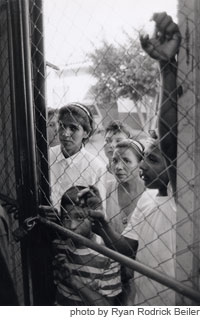Last week, in a little-noticed story, a group of Catholic members of Congress sent a letter to the U.S. Conference of Catholic Bishops, asking the bishops to help mobilize the church toward ending the war in Iraq.
The letter was sent to Bishop William S. Skylstad, president of the USCCB and Bishop Thomas G. Wenski, International Justice and Peace Committee Chair, requesting a meeting with the USCCB. The members explained:
We have taken great comfort in the prophetic words of many Catholic leaders, relied on them for inspiration during our deliberations, and welcomed them in helping shape policy. If we understand the Catholic tradition correctly, thoughtful Church leaders around the world do not believe that the war in Iraq meets the strict conditions for a just war or the high moral standards for overriding the presumption against the use of force. We agree and seek an end to this injustice.
Our concerns are rooted in both the political realm and in our faith and manifest in our efforts to enact legislation that will bring an end to this war. Pope John Paul II framed the moral question well when he said: “When, as in Iraq in these days, war threatens the fate of humanity, it is even more urgent to proclaim with a strong and decisive voice that peace is the only path for building a society which is more just and marked by solidarity. Violence and weapons can never resolve the problems of man.”
Religion News Service reported:
Sister Mary Ann Walsh, a spokeswoman for the USCCB, said the bishops were considering the letter and that they have already made repeated statements about the war. “Certainly the bishops have made no secret about their concerns over the war in Iraq,” Walsh said.
As Congress begins this week to seriously debate legislative proposals to end the war, the continued voice of the church is critical. As the members of Congress concluded:
In our own education in the faith, we find the testimony of the scriptures compelling, and although we have no illusions about the complexities of our current situation in Iraq, we have come to believe that peace cannot simply exist as an ideal—our efforts must be accompanied by actions as we embrace the teachings of peace and justice.

